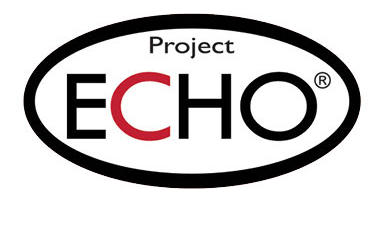
The University of Minnesota College of Pharmacy is proud to host the nation's first Project ECHO program focused on pharmacogenomics-informed clinical treatment.
As a profession, pharmacy is at the beginning stages of readying its current workforce for healthcare guided by pharmacogenomics (PGx). PGx is not yet used clinically in most healthcare organizations, and active integration of PGx into pharmacists' practices is especially a need in rural areas and those primarily caring for underserved groups. To fully realize the potential for PGx, the clinical workforce must have equitable access to training in its use.
About PGx ECHO
PGx ECHO is a collaborative effort of the Hub Site at the University of Minnesota and six Spoke Sites: Children's Minnesota, Ferris State University, M Health Fairview, North Dakota State University, Sanford Health, and South Dakota State University. PGx ECHO aims to address the lack of PGx education and support for implementation across rural and underserved areas in the Midwest; a further goal is to assist other regions of the U.S. in creating their own PGx ECHOs.
PGx ECHO focuses on improving the confidence of healthcare professionals in the use of PGx in patient care by providing them with education and consultation through telementoring as they incorporate evidence-based PGx information into their clinical practice. PGx ECHO meets monthly and is composed of PGx specialists and healthcare professionals who desire patient consultation, advanced case-based learning and short didactic education in PGx. Current programming is free and open to licensed healthcare professionals involved in direct patient care with a priority for those in rural and underserved areas. To maintain the objective and commercial-free programming of the PGx ECHO, attendees' affiliation must be academic and/or clinical in nature.
The Four Principles of the ECHO Model
- Use technology to leverage scarce resources
- Share "best practices" to reduce disparities
- Apply case-based learning to master complexity
- Evaluate and monitor outcomes
Program Objectives of PGx ECHO
- Disseminate PGx knowledge by providing consultation on participants PGx patient cases and recommendations for improving medication outcomes
- Support participants in building practice-relevant skills and applying PGx knowledge
- Build a PGx community of practice and collaboratively model practice for PGx guided care delivery
- Promote health equity by expanding patient access to PGx-guided medication management
PGx ECHO Commitment to Collaboration
In the spirit of collaboration, PGx ECHO is committed to working with community partners. PGx ECHO will:
- Offer regular didactic presentations on PGx-related topics.
- Offer special curricula and training opportunities on PGx-related topics.
- Review patient cases presented by clinicians at partnering clinics and provide timely, written recommendations.
- Provide routine, remote IT user support to facilitate connectivity and participation.
- Be available, when possible, outside of teleconference times for emergent questions or issues, as necessary.
Interested in joining? pgxecho@umn.edu
Connect with us on Twitter: @pgxecho
View recordings of past didactic presentations on Youtube. Case presentations are not recorded so join our sessions live to participate in the discussion.
PGx ECHO meets the third Friday of every month at 12:00 PM CT.
Session Format
PGx ECHO holds monthly, hour-long Zoom sessions PGx ECHO holds monthly, hour-long Zoom sessions comprising an educational mini-lecture or paper, case presentations and discussions. "All teach, all learn" is a foundational element supporting each participant to share and contribute to the sessions and learn through advanced case-based practice. The design of the session facilitates a community of learning and continued engagement.
2024 Schedule
Date of Session | Coordinating Institution | Didactic Topic and Speaker | Case Presenter(s) |
|---|---|---|---|
January 19, 2024 | St. Elizabeth Healthcare | Genetics of Drug-Induced QT Prolongation: What to do in the absence of clinical guidelines? | Josiah Allen, PharmD | Josiah Allen, PharmD |
February 16, 2024 | Sanford Health | Pharmacogenetic Insights into Statin-Induced Rhabdomyolysis | Rebecca Aubart, PharmD | Rebecca Aubart, PharmD |
March 15, 2024 | University of Michigan / Michigan Medicine | Utilizing Pharmacogenomics in Ambulatory Psychiatry Clinics | Kristen Ward, PharmD | Anna Wu, PharmD + Kristen Ward, PharmD |
April 19, 2024 | Sanford Health | The Role of Pharmacogenomics in Anti-Seizure Medications: Optimizing Medication Therapy Management in a PGx Clinic | Kristen Jacobsen, PharmD | Kristen Jacobsen, PharmD |
May 17, 2024 | University of Minnesota | Potential Escitalopram Related Serotonin Syndrome and Withdrawal | Elizabeth Tran, PharmD + Mark Schneiderhan, PharmD, BCPP | Elizabeth Tran, PharmD + Mark Schneiderhan, PharmD, BCPP |
June 21, 2024 | Nicklaus Children's Hospital | Factor V Leiden and its Significance for Pharmacogenomics | Yana Vorontsova, PharmD, MBA | Yana Vorontsova, PharmD, MBA |
July 19, 2024 | Children's Mercy | Clinical Benefits of CYP Inhibitors | Tracy Sandritter, PharmD, BCPPS + Alexa Pagano, MD | Tracy Sandritter, PharmD, BCPPS + Alexa Pagano, MD |
August 16, 2024 | Sanford Health | Clinical Considerations for A Lesser Known Drug-Gene Interaction: Metoclopramide-CYP2D6 | Jordan Baye, PharmD, MA + Halle Brady, PharmD | Halle Brady, PharmD |
September 20, 2024 | Minneapolis VA | TBA | Tessa Kemp, PharmD | Tessa Kemp, PharmD |
October 18, 2024 | Children's Hospital Los Angeles | TBA | Jenny Nguyen, PharmD, APh, BCPS | TBA |
November 15, 2024 | Children's Minnesota | TBA | Courtney Paetznick, PharmD | Courtney Paetznick, PharmD |
December 20, 2024 | No session due to holiday | N/A | N/A |
2023 Schedule
| Date of Session | Coordinating Institution | Didactic Topic and Speaker | Case Presenter(s) |
|---|---|---|---|
| January 20, 2023 | Manchester University | Polypharmacy and Deprescribing: Is There a Role for PGx? | Teresa DeLellis, PharmD, BCPS, BCGP | Teresa DeLellis, PharmD, BCPS, BCGP |
| February 17, 2023 | University of Florida | TPMT / NUDT15 and Mercaptopurine | Kelsey Cook, PharmD, BCPS | Nathan Seligson, PharmD |
| March 17, 2023 | Sanford Health | Beyond 2D6: Integrating Complex Histories and External Results into Psychiatric Pharmacogenomic Care | Sarah Mills, PharmD | Sarah Mills, PharmD + Jordan Baye, PharmD, MA |
| April 21, 2023 | Nemours Children's Health | Pharmacogenomic Testing in a Pediatric Patient with Perioperative Methadone Toxicity | Benjamin Duong, PharmD | Benjamin Duong, PharmD |
| May 19, 2023 | NorthShore University Hospital | Challenges in RYR1 Implementation for Assessing Risk of Malignant Hyperthermia Susceptibility | Dyson Wake, PharmD | Dyson Wake, PharmD |
| June 16, 2023 | Cincinnati Children's Hospital Medical Center | A Case of Risperidone-Induced Hyperprolactinemia in a Child with Fragile X Syndrome | Laura Ramsey, PhD | Laura Ramsey, PhD |
| July 21, 2023 | Yale New Haven Health | Complex Antiplatelet Management and Challenges with biobank CYP2C19 Return of Results | Rebecca Pulk, PharmD, MS, BCPS | Rebecca Pulk, PharmD, MS, BCPS |
| August 18, 2023 | University of Montana | Equitable Pharmacogenomic Implementation in Underserved Populations | Shayna Killam, PharmD, MS + Jade Bosic-Reiniger, PharmD, MPH, MPA | Jade Bosic-Reiniger, PharmD, MPH, MPA |
| September 15, 2023 | MedStar Health | Incorporating phenoconversion and a multigene panel into patient care: a discussion of PGx-ACT, a randomized controlled trial | D. Max Smith, BCPS, PharmD | D. Max Smith, BCPS, PharmD |
| October 20, 2023 | Atrium Health | PGx and Serotonin Syndrome in a Pediatric Patient | Grace Nguyen, PharmD, BCPS | Andrea Dobbs, MS + Grace Nguyen, PharmD, BCPS |
| November 17. 2023 | University of Colorado Skaggs School of Pharmacy and Pharmaceutical Sciences | Pharmacogenomics Complicated by Post-Covid | Yee Ming Lee, PharmD, BCPS, ABCP + Aracely Sosa, BS | Aracely Sosa, BS + Yee Ming Lee, PharmD, BCPS, ABCP |
| December 15, 2023 | Mayo Clinic | Dapsone Dilemma: Unmasking G6PD Deficiency in Transplantation - A strategic approach to testing and treatment | Razan El Melik, PharmD, RPh | Alexander McCarthy, PharmD, MS + Razan El Melik, PharmD, RPh |
2022 Schedule
| Date of Session | Coordinating Institution | Didactic Topic and Speaker | Case Presenter(s) |
|---|---|---|---|
| January 21, 2022 | Children's Minnesota | Pharmacogenomic Testing and Atomoxetine | David Gregornik, BA, BS, PharmD | Courtney Paetznick, PharmD; David Gregornik, BA, BS, PharmD |
| February 18, 2022 | Mayo Clinic | Pharmacogenetic Considerations in a Patient with Treatment-Resistant Depression | Dimple Dhakal, PharmD, MS | Dimple Dhakal, PharmD, MS; Eric T. Matey, PharmD, MBA |
| March 18, 2022 | Ferris State University | DPYD and Capecitabine: Direction Pharmacogenomic Decisions | Samuel Snowaert, BS, PharmD, MBA | Maja Hill, PharmD; Claire Saadeh, BS, PharmD; David Bright, PharmD, MBA |
| April 15, 2022 | University of Minnesota | Legislative Update | Pamala Jacobson, PharmD, FCCP | Sue Paul, BS |
| May 20, 2022 | University of Minnesota | Introduction to Phenoconversion and Assessment Tools | Jeffrey Bishop, PharmD, MS, BCPP, FCCP | Mark Schneiderhan, PharmD, BCPP |
| June 17, 2022 | Sanford Health / SDSU | CYP2C19-Clopidogrel Interactions in the Neurovascular Setting | Jordan Baye, PharmD, MA | Samantha Frear, PharmD; Jordan Baye, PharmD, MA |
| July 15, 2022 | University of Minnesota | CPIC Guideline Development | Jeffrey Bishop, PharmD, MS, BCPP, FCCP | Mark Schneiderhan, PharmD, BCPP |
| August 19, 2022 | Cleveland Clinic | Pharmacogenomics and Statin-Associated Muscle Symptoms (SAMS) | Jennifer Hockings, PharmD, PhD; Alexsandra Nilges, PharmD, MBA | Alexsandra Nilges, PharmD, MBA |
| September 16, 2022 | MHealth Fairview | Pharmacogenomics and Voriconazole in a Pediatric Patient | Susie Long, PharmD; Nicole Louden, PharmD, BCPPS | Nicole Louden, PharmD, BCPPS; Susie Long, PharmD |
| October 21, 2022 | SUNY Upstate Medical University | Pharmacogenomics in a Patient with Epilepsy | Danielle DelVecchio, PharmD, BCPS | Karen Albright, PhD, DO, MPH |
| November 18, 2022 | Children's Minnesota | Pharmacogenomics in a Pediatric Patient with ADHD | David Gregornik, BA, BS, PharmD | Courtney Paetznick, PharmD; David Gregornik, BA, BS, PharmD |
| December 16, 2022 | Mayo Clinic | CYP3A Genetics + Itraconazole | Jessica Wright, PharmD, RPh, BCACP | Serena Mitaly, PharmD +Jessica Wright, PharmD, RPh, BCACP |
2021 Schedule
| Date of Session | Coordinating Institution | Didactic Topic and Speaker | Case Presenter(s) |
|---|---|---|---|
| October 15, 2021 | Manchester University | Utility of Pharmacogenomics | David Kisor, BS, PharmD | Joseph Brown, BS; Thomas Smith, PharmD |
| November 19, 2021 | Sanford Health / NDSU | Pharmacogenomics Clinical Resources | Natasha Petry, PharmD | Samantha Frear, PharmD; Natasha Petry, PharmD, MPH |
| December 17, 2021 | Sanford Health / SDSU | SSRIs and Pharmacogenomics | Jordan Baye, PharmD, MA | Natalie Sovell, PharmD; Jordan Baye, PharmD, MA |
People | Hub Site
| Hub Team Member | Organization | Role |
|---|---|---|
| Jeffrey Bishop | University of Minnesota | ECHO Facilitator/Mentor/Subject Matter Expert |
| Jacob Brown | University of Minnesota | ECHO Facilitator/Mentor/Subject Matter Expert |
| Pamala Jacobson | University of Minnesota | ECHO Facilitator/Mentor/Subject Matter Expert |
| Alyssa Johnson | University of Minnesota | ECHO Program Coordinator/IT Support |
| David Stenehjem | University of Minnesota | ECHO Facilitator/Mentor/Subject Matter Expert |
| Lindsay Sorge | University of Minnesota | ECHO Project Manager |
People | Spoke Sites
| Spoke Lead | Organization | Role |
|---|---|---|
| Jordan Baye | Sanford Health/South Dakota State University | Mentor/Subject Matter Expert |
| David Bright | Ferris State University and affiliates | Mentor/Subject Matter Expert |
| David Gregornik | Children’s Minnesota | Mentor/Subject Matter Expert |
| Natasha Petry | Sanford Health/North Dakota State University | Mentor/Subject Matter Expert |
| Susie Long | M Health Fairview, Minneapolis | Mentor/Subject Matter Expert |
